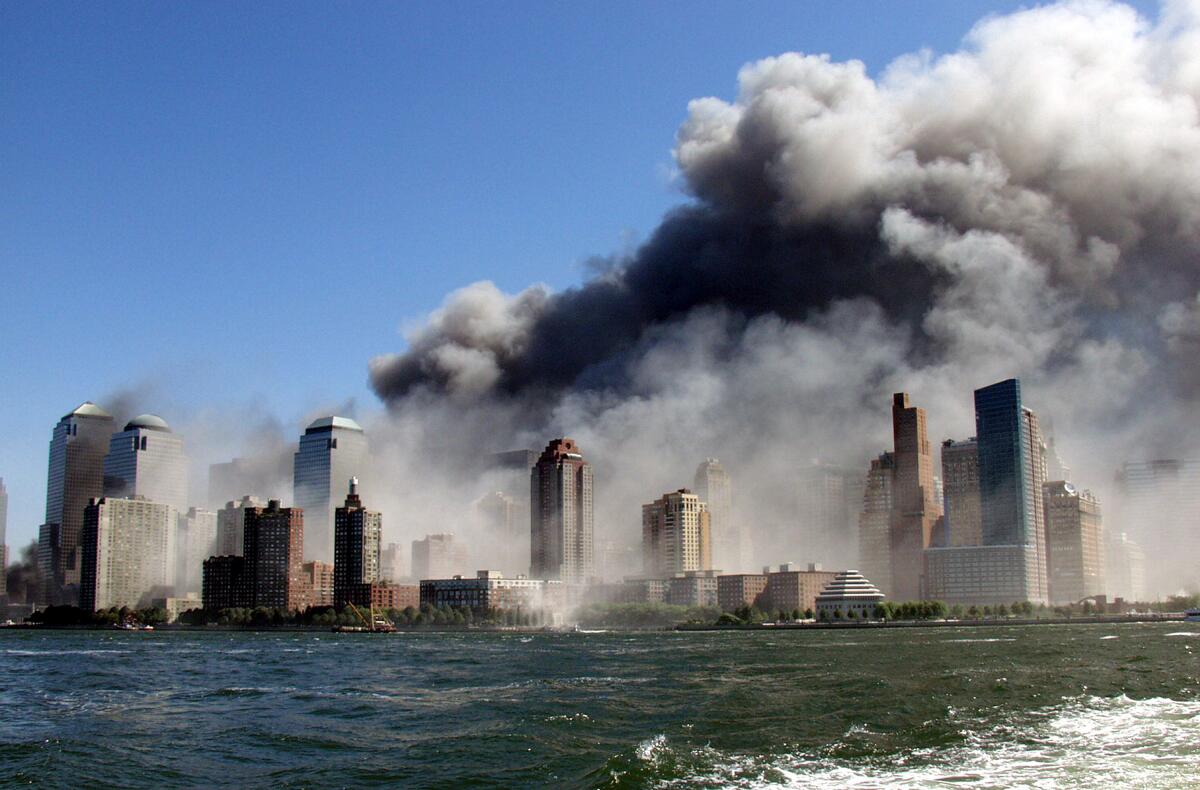Column: How the war on terror came to look like a culture war among ourselves

- Share via
I got back to the U.S. from my honeymoon on Sept. 10, 2001. My wife went straight home to Washington, D.C., to start her new job at the Justice Department. I went to Washington state, where we’d gotten married, to retrieve our dog Cosmo, whom we’d left with family.
I was in a hotel room in Pendleton, Ore., when I saw the first reports of a plane hitting the World Trade Center. I used something called AOL Instant Messenger to tell my co-workers to turn on the TV.
Because my wife and I had dated for a long time, I used to say that the war on terror changed our daily lives more than getting married. As weird as that sounds, in some ways it was true. The Washington we returned to had changed. Her new job as the attorney general’s chief speechwriter at the dawn of the war on terror was a bracing new chapter for us both. And politics, particularly conservative politics — my beat, for want of a better term — transformed almost overnight.
I was editor of National Review Online back then, and it fell to me to “fire” Ann Coulter from National Review, which mostly amounted to dropping her syndicated column. A few days after 9/11, Coulter had written this about airport security: “It is preposterous to assume every passenger is a potential crazed homicidal maniac. We know who the homicidal maniacs are. They are the ones cheering and dancing right now. We should invade their countries, kill their leaders and convert them to Christianity.”
The rhetoric of the next decade often echoed this sort of beating of the war drum. A flood of books — both serious and silly — poured forth about the war on terror, World War IV and the “generational” struggle with Islam and Islamists that, we were told, would define our future and our children’s future.
Two decades later, it seems like the past really is a foreign country, and not just for the 1 in 4 Americans who weren’t alive on 9/11.
We always see the past through the prism of the present. As the historian R.G. Collingwood put it, “Every new generation must rewrite history in its own way.” For instance, after 9/11, the dates that defined the past shriveled. The Bolshevik Revolution of 1917 and the fall of the Berlin Wall and end of the Cold War in 1989 shrank, while 1979, the founding of revolutionary Iran, seemed to grow larger.
Similarly, it’s hard not to look back on the excesses of the war on terror and see our reflection there. Many on the left greeted the crisis more as an opportunity to find fault with America than as an opportunity to unify against a common foe.
From hysteria on the left about the Patriot Act’s supposedly tyrannical assault on libraries to the right’s wild fantasies that America was surrendering to sharia law, the war on terror, in hindsight, looks a lot like our current culture war, just with different issues.
In the early years, fretting over the threat to free speech posed by the war on terror was a liberal and left-wing obsession. Ward Churchill, the University of Colorado professor who called the victims of 9/11 “little Eichmanns,” became a martyr to free expression. Dissent, we were told, was the highest form of patriotism.
Yet when Barack Obama became president, dissent lost its patriotic glow for leftists who wanted a heckler’s veto against those who would “provoke” jihadists with cartoons or films mocking Muhammad or even asinine “own the libs” stunts like burning the Quran.
Wherever you come down on the specific controversies over the last 20 years, it’s hard not to be filled with regret and a little embarrassment by the solipsistic tendency of American politics to turn every issue into an excuse to vent mutual partisan animosity.
Even more depressing is the realization that the last two decades have left us less prepared, at least in the ways that matter most, for the next 9/11. Of course, the next 9/11 will look different, but the reaction probably won’t.
More to Read
A cure for the common opinion
Get thought-provoking perspectives with our weekly newsletter.
You may occasionally receive promotional content from the Los Angeles Times.











